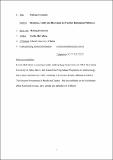Making ecumenes : ontogeny, amity and resistance in Brazilian indigenous pathways
Abstract
The article reconsiders the concept of ecumene in anthropology, through a focus on Panoan‐language‐speaking indigenous peoples in Brazil. It explores the notion that ecumenes are intersubjectively forged space‐times and it critiques culturalist and evolutionist approaches to the ecumene concept. Drawing on ethnography of Yawanawá and Cashinahua, analysis treats ecumenes as dynamic space‐times within which amity and enmity arise and identity politics are forged or falter. These arise phenomenologically over time as bodies acquire knowledge, capacity, creativity, and agency, resulting in the sedimentation and fixation of humanness, seen as contingent and temporary in nature. It is argued that if ecumene is to be a useful category of analysis, it is necessary to put aside heuristic divisions between indigenous and anthropological conceptual and theoretical framing of global historical processes. Ecumene needs be framed with respect to an analysis of graduated sovereignty, predatory capitalism, and institutionalized racism, as Amerindians experience and frame these historically.
Citation
McCallum , C A 2020 , ' Making ecumenes : ontogeny, amity and resistance in Brazilian indigenous pathways ' , Journal of the Royal Anthropological Institute , vol. 26 , no. 3 , pp. 575-593 . https://doi.org/10.1111/1467-9655.13315
Publication
Journal of the Royal Anthropological Institute
Status
Peer reviewed
ISSN
1359-0987Type
Journal article
Description
Funding: CAPES (Brazil) postdoctoral grant (BEX 1482-14/9).Collections
Items in the St Andrews Research Repository are protected by copyright, with all rights reserved, unless otherwise indicated.

